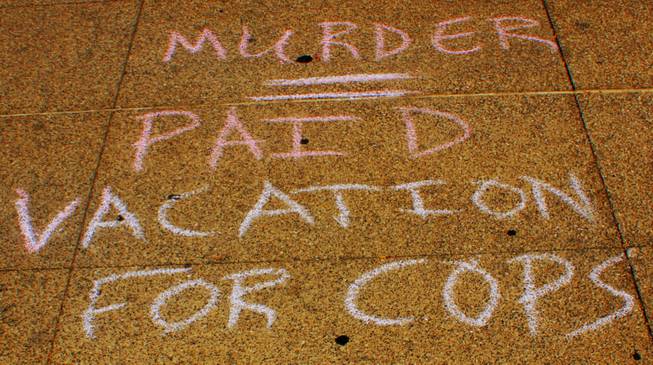
Special to the Sun
Chalk messages, such as this one, were written on sidewalks outside the Metro Police Headquarters and the Regional Justice Center.
Friday, Aug. 16, 2013 | 2 a.m.
A First Amendment battle is looming in Clark County District Court, and the attorney for four Las Vegas protesters facing anti-graffiti charges says you can chalk it up to overzealous law enforcement.
The four activists have been charged with causing up to $5,000 worth of damage after writing messages in chalk outside of Metro Police headquarters and the Clark County Regional Justice Center.
Brian Ballentine, 31, Kelly Wayne Patterson, 44, Hailee Jewell, 18, and Catalino de la Cruz Dazo Jr., 20, face multiple gross misdemeanor charges of conspiracy to place graffiti and defacing property after conducting chalk protests against police brutality.
While the chalk — an art supply used for decades by children to mark sidewalks and driveways across the country — might seem harmless, it does damage over time, according to Metro arrest reports.
The sidewalks in question are coated with sealant to increase the concrete’s longevity, and the power-washer police say was necessary to clean up the chalk strips away the sealant.
The eroding effects of chalk don’t appear to have been a concern for nonprotest chalk-related city activities. The most recent First Friday had chalk art that spanned an entire street. Cleanup totaled about $2,000, according to First Friday sources.
Attorney Robert Langford, who is providing pro bono representation to the protesters, said he thinks the charges were ridiculous.
Langford said prosecutors are claiming power-washers and a graffiti-abatement team were used to wash away the protesters’ messages so that the expense would raise the criminal classification to a gross misdemeanor. Each gross misdemeanor charge carries the threat of a year in jail.
Langford called the charges “draconian” and said he plans to fight the case on First Amendment grounds. He said he believes the protesters were targeted because of what the chalk said, not what it did.
According to police records, officers had been monitoring the chalk activists, who are associated with Nevada Cop Block and Sunset Activist Collective, on social media sites and had warned them to stop.
On July 13, officers watched the protesters write in chalk outside of police headquarters and cited some of them. Officers then learned Patterson and Ballentine had invited people to a rally outside of the Regional Justice Center to protest the citations, according to court records.
At that July 18 protest, activists wrote in colored chalk messages like “(EXPLETIVE) THE COPS” and “(EXPLETIVE) PIGS!”
According to police reports:
At one point an officer noticed a woman erase the message with her coffee. Patterson then wrote a new message.
An officer asked Ballentine if the protesters planned to clean up the chalk, and he refused to answer.
Cleanup of the police headquarters protest cost $300 and the courthouse protest cost $1,250, not counting the alleged damage to the sidewalks and sealant attributed to the power-washers.
The charges took the protesters by surprise, said activist Jen Harney, who was not arrested. Part of the reason they picked chalk was because of how easy chalk is to erase.
Using chalk, Harney said, is a way of letting a protest message linger without littering.
Whether chalk constitutes graffiti is a legal gray area.
While the more high-profile chalking cases tend to involve political speech, a mom in Richmond, Va., ended up being sentenced to community service for letting her 4-year-old draw on rocks with chalk, according to a local CBS station.
A San Diego case that wrapped in July garnered national attention, particularly since the judge barred the defense from arguing First Amendment claims.
Ultimately, Jeff Olson, who was protesting banks, was acquitted after five hours of jury deliberation. The city’s mayor dubbed the case “stupid,” the Associated Press reported.
In one case, a federal appeals court did rule against a chalk protester that left his message outside the White House.
“No one has a First Amendment right to deface government property,” wrote Judge Brett Kavanaugh, who noted he didn’t want the “fog of First Amendment doctrine to make this case seem harder than it is.”
Langford chalked the Washington, D.C., ruling up to the government having an interest in ensuring the “aesthetically pleasing grounds of the White House are kept that way.”
Langford said the protesters would speak at a media event Monday.
A preliminary hearing has been set for Dec. 9 in Las Vegas Township Justice Court front of Judge Cynthia Cruz.

Join the Discussion:
Check this out for a full explanation of our conversion to the LiveFyre commenting system and instructions on how to sign up for an account.
Full comments policy